Economics Reimagined: A Discussion on Building a Human Rights Economy
Description
The Universal Declaration of Human Rights, adopted 75 years ago by the United Nations, set forth a set of civil, social, and economic rights that inspired the development of human rights’ laws around the world. The declaration has been a north star for those working to build an equitable and fair society for all people ever since. But over the intervening decades, our economic agenda and policymaking have often focused on economic growth and business success metrics at the expense of human well-being. This economic framework, which preferences profits over people, has contributed to skyrocketing wealth and income inequality, economic instability, social unrest, and recently the rise of new authoritarian movements. The economic rights from the Universal Declaration of Human Rights, however, are reemerging as part of a call for a more moral and equitable economic order.
In this context, the Office of the United Nations High Commissioner for Human Rights (OHCHR) and The New School’s Institute on Race, Power and Political Economy recently announced the Partnership for a Human Rights Economy. The partnership will help advance scholarship and economic policymaking toward achieving human rights. Join the Aspen Institute Economic Opportunities Program and The New School’s Institute on Race, Power and Political Economy for “Economics Reimagined: A Discussion on Building a Human Rights Economy” on January 19 from 2:00 to 3:45 p.m. EST. Learn more about The New School’s exciting new partnership with the UN and explore the legacy and lasting influences of the Universal Declaration of Human Rights, the philosophies and values that have come to shape our economy and the consequences, and how we build a moral and inclusive economy based on human rights.
Share
Tweet I enjoyed hearing Todd Howland @UNHumanRights, @RangitadeSilva, @DarrickHamilton, @TheaMeiLee, @jimwallis, and @BCAppelbaum #talkopportunity about building a human rights economy. Learn more via @AspenJobQuality + @RacePowerPolicy.
Tweet In this video, hear @AspenJobQuality, @RacePowerPolicy, and guests discuss the Universal Declaration of Human Rights, the values that shaped our economy, and what we can do to build a moral and inclusive economy.
Tweet Our economic policies have contributed to inequality, unrest, and authoritarianism. How can we rebuild our economy based on human rights? Hear @AspenJobQuality, @RacePowerPolicy, and guests #talkopportunity in this video.
Tweet Our economic and policy agendas often focus on business success over human well-being. How can we build a more moral and equitable economic order? Hear @AspenJobQuality, @RacePowerPolicy, and guests #talkopportunity in this video.
Tweet The Partnership for a Human Rights Economy — by @UNHumanRights and @RacePowerPolicy — works to advance scholarship and policymaking toward achieving human rights. Learn more via @AspenJobQuality + @RacePowerPolicy.
Tweet Video: Building a Human Rights Economy. Featuring Todd Howland @UNHumanRights, @RangitadeSilva, @DarrickHamilton, @TheaMeiLee, @jimwallis, and @BCAppelbaum. Hosted by @AspenJobQuality and @RacePowerPolicy.
Opening Remarks

Todd Howland
Chief of Branch, United Nations Office of the High Commissioner for Human Rights @UNHumanRights
Todd Howland has more than 25 years of professional experience in the field of human rights. He presently serves as Chief, Right to Development, Sustainable Development, and Economic and Social Rights Branch of the Office of the UN High Commissioner for Human Rights (OHCHR) in Geneva. He has served as OHCHR representative in Colombia, the Democratic Republic of Congo, and Angola, among other UN posts.
He has authored numerous scholarly articles on human rights, including in Human Rights Quarterly, the Denver Journal of International Law and Policy, and the Virginia Journal of International Law, and he has published extensively on human rights in newspapers and magazines, including the Washington Post, the Los Angeles Times, the Boston Globe, the Toronto Globe and Mail, and Revista Semana.
Howland was director of the Robert F. Kennedy Center for Human Rights in Washington DC. He has also worked at El Rescate, the European Commission, and in Ethiopia for the Carter Center. Howland was a professor of human rights law at Hankuk University in Seoul, South Korea. He holds a law degree and a master’s degree from the University of Denver and was a visiting fellow at the Harvard Human Rights Program.
Speakers
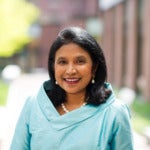
Rangita de Silva de Alwis @RangitadeSilva
Associate Dean of International Affairs, University of Pennsylvania Carey Law School @pennlaw
Rangita de Silva de Alwis is a globally recognized international women’s rights expert. She is the associate dean of international affairs at the University of Pennsylvania Carey Law School, where she directs the Global Institute for Human Rights and leads the Advancing Inclusive Leadership program. Prof. Rangita de Silva de Alwis is member-elect to the expert committee on the Convention on the Elimination of Discrimination Against Women for the term 2023-2026 and is also faculty at the Harvard Kennedy School of Government.
Rangita is a women’s human rights scholar and practitioner with over 25 years of experience working globally in over 25 countries with a vast network of academic institutions, government, and non-government entities on women’s human rights law and policymaking and institutional reform. She has convened several transnational networks, including the Women’s Leadership Network in Muslim Communities, the Asia Cause Lawyer Network in India, and the Gender and Law Expert Group with women academics in China. She has spoken around the world on gender-based law reform and has published widely with the United Nations, the World Bank, and in various leading law journals. In recognition of Rangita’s global work in advancing women’s rights, she was named the Hillary Rodham Clinton Distinguished Fellow on Gender Equity, Georgetown Institute for Women, Peace and Security. She received her doctorate in law from Harvard Law School.
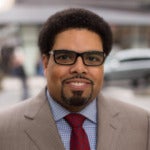
Darrick Hamilton @DarrickHamilton
Henry Cohen Professor of Economics and Urban Policy; Founding Director, Institute on Race, Power and Political Economy, The New School @RacePowerPolicy
Darrick Hamilton is a university professor, the Henry Cohen Professor of Economics and Urban Policy, and the founding director of the Institute on Race, Power and Political Economy at The New School. Considered one of the nation’s foremost scholars, economists, and public intellectuals, Hamilton’s accomplishments include recently being profiled in the New York Times, Mother Jones, and the Wall Street Journal and being featured in POLITICO’s 2017 “50 Ideas Shaping American Politics and the People Behind Them” issue. Also, he is a member of the Marguerite Casey Foundation in partnership with the Group Health Foundation’s inaugural class of Freedom Scholars.
Hamilton has been involved in crafting policy proposals, such as baby bonds and a federal job guarantee, which have garnered a great deal of media attention and served as inspirations for legislative proposals at the federal, state, and local levels. He has served as a member of the economic committee of the Biden-Sanders Unity Task Force; he has testified before several Senate and House committees, including the Joint Economic Committee on the nation’s potential policy responses to the COVID-19 pandemic-induced health and economic crises; he was a surrogate and advisor for the Bernie Sanders presidential campaign; and he has advised numerous other leading members of Congress, as well as various 2020 presidential candidates.
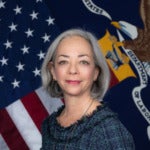
Thea Lee @TheaMeiLee
Deputy Undersecretary for International Affairs, Bureau of International Labor Affairs, U.S. Department of Labor @ILAB_DOL
Thea Lee was named deputy undersecretary for international affairs on May 10, 2021. She has been advocating for workers’ rights, both domestically and internationally, for over thirty years. She was president of the Economic Policy Institute, a progressive pro-worker Washington think tank, from January 2018 to May 2021 and an international trade economist at EPI in the 1990s. From 1997 to 2017, Lee worked at the AFL-CIO, a voluntary federation of 56 national and international labor unions that represent 12.5 million working men and women. At the AFL-CIO, she served as deputy chief of staff, policy director, and chief international economist.
Lee has served on the State Department Advisory Committee on International Economic Policy, the Export-Import Bank Advisory Committee, and on the boards of directors of the National Bureau of Economic Research, the Congressional Progressive Caucus Center, the Center for International Policy, and the Coalition on Human Needs, among others. She served on the U.S.-China Economic and Security Review Commission from 2018 to 2020. In 2022, she was appointed to the Congressional-Executive Committee on China.
Lee holds a master’s degree in economics from the University of Michigan at Ann Arbor and a bachelor’s degree in economics cum laude from Smith College.
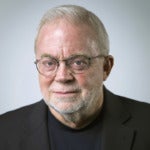
Jim Wallis @jimwallis
Founding Director, Center on Faith and Justice, Georgetown University @GeorgetownFaith
Jim Wallis is the inaugural holder of the Endowed Chair in Faith and Justice and the founding director of the Center on Faith and Justice at Georgetown University.
He is a globally respected writer, teacher, preacher, and justice advocate who believes the gospel of Jesus must be transformed from its cultural and political captivities and always be “good news” to the poor and oppressed. He is a New York Times bestselling author, widely recognized public theologian, renowned speaker, and regular international commentator on ethics and public life.
He served on President Obama’s White House Advisory Council on Faith-Based and Neighborhood Partnerships and has taught faith and public life courses at Harvard and Georgetown University. He also serves as a senior fellow at Georgetown University’s Berkley Center for Religion, Peace and World Affairs.
Moderator
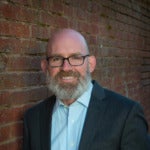
Binyamin Appelbaum @BCAppelbaum
Lead Writer, Economics and Business, The New York Times Editorial Board @nytopinion
Binyamin Appelbaum is the lead writer on economics and business for the New York Times editorial board. He is based in Washington DC.
In 2020, Mr. Appelbaum played a leading role in “The America We Need,” a series of special sections arguing that the coronavirus pandemic laid bare the need for wide-ranging changes to address the inequities of American life.
Mr. Appelbaum’s work has often explored the evolution of economic policy and particularly the rise of faith in markets as the solution to a wide range of policy problems. In 2019, he told that story in his first book, “The Economists’ Hour: False Prophets, Free Markets and the Fracture of Society.”
Before joining the editorial board in 2019, Mr. Appelbaum worked for a decade as a Washington correspondent for The Times, leading the paper’s coverage of the Federal Reserve under Ben Bernanke and Janet Yellen. He also wrote about a wide range of other issues in economic policy, including a 2010 investigation of the tension between economic dependence on the federal government and opposition to public spending; a 2012 series about the decline of federal income taxation; and a series of stories in 2015 and 2016 about the political consequences of regional economic decline.
Mr. Appelbaum is a native of Massachusetts. He holds a degree in history from the University of Pennsylvania and previously worked for the Florida Times-Union, the Charlotte Observer, the Boston Globe, and the Washington Post. In 2008, his work was a finalist for the Pulitzer Prize in Public Service.
Opportunity in America
Opportunity in America, an event series hosted by the Economic Opportunities Program, considers the changing landscape of economic opportunity in the US and implications for individuals, families, and communities across the country. The series highlights the ways in which issues of race, gender, and place exacerbate our economic divides, and ideas and innovations with potential to address these challenges and broaden access to quality opportunity.
We are grateful to Prudential Financial, Walmart, the Surdna Foundation, the W. K. Kellogg Foundation, Bloomberg, and the Mastercard Center for Inclusive Growth for their support of this series.
Learn More
The Economic Opportunities Program advances strategies, policies, and ideas to help low- and moderate-income people thrive in a changing economy. Follow us on social media and join our mailing list to stay up-to-date on publications, blog posts, events, and other announcements.